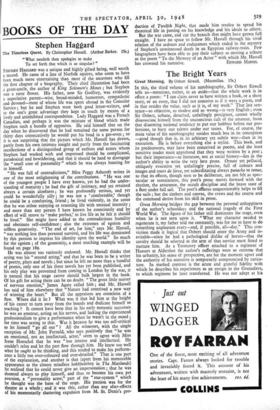BOOKS OF THE DAY
Stephen Haggard
The Timeless Quest. By Christopher Hassan. (Arthur Barker. 15s.) "What needeth then apologies to make To set forth that which is so singular?"
STEPHEN HAGGARD was a unique and highly gifted being, well worth a record. He came of a line of Norfolk squires, who seem to have been much more entertaining than most of the ancestors who fill the first chapter of a biography. Their chief illustration had been a great-uncle, the author of King Solomon's Mines ; but Stephen was a rarer flower. His father, now Sir Godfrey, was evidently a superlative parent—wise, broad-minded, humorous, sympathetic and devoted—most of whose life was spent abroad in the Consular Service ; but he and Stephen were both good letter-writers, and to the son's great advantage they kept in touch by means of a lively and uninhibited correspondence. Lady Haggard was a French Canadian, and perhaps it was the mixture of blood which made Stephen such a bundle of opposites. He said himself that on the day when he discovered that he had remained the same person for thirty days consecutively he would put his head in a gas-oven ; so it is not surprising that the picture which Mr. Hassall has drawn, partly from his own intimate insight and partly from the fascinating recollections of a distinguished group of authors and actors whom Stephen had worked with and impressed should be complicated, paradoxical and bewildering, and that it should be hard to disengage the "small core of personality" which he was always hunting for in himself.
"He was full of contradictions;" Miss Peggy Ashcroft writes in one of the most enlightening of the contributions. "He was one of the youngest people I have ever known, yet he had the under- standing of maturity ; he had the gift of intimacy, and yet retained always a certain aloofness ; he was profoundly serious, and yet could be wonderfully silly ; he was not a ' comfortable ' though he could. be a comforting, friend ; he lived violently, in 'comfortable,'
sense that he was either enjoying or resenting life with unusual intensity ; and more than any person I have known he consciously and by effort of will strove to 'make perfect,' to live life as he felt it should be lived." She might have added to the contradictions humility and obstinate self-confidence ; also the extremes of egoism and selfless generosity. "The end of art, for him," says Mr. Hassan, "was nothing less than personal survival, and his life was dominated by this passion to impress his identity upon the world." So much for the egoism ; of the generosity, a most touching example will be found on page 189.
He was ,almost too variously endowed. Mr. Hassall thinks that acting was his "second string," and that he was born to be a writer of poetry, plays and novels • but since he left no more than a handful of poems, only one of his three novels has yet been published, and his only play was prevented from coming to London by the war, it is natural that his stage career should bulk largest in the book. Of his gift for acting there can be no doubt. "The great little master of nervous emotion," James Agate called him ; and Mr. Hassall has said of him elsewhere that "Nature had contrived a new way of winning the heart." But all the appraisers are conscious of a flaw. Where did it lie ? What was it that led him at the height of his career to turn away from the boards and dedicate himself to teaching ? It cannot have been that in his early meteoric successes he was an amateur, acting on his nerves, and lacking the experienced professionalism to give a performance when he wasn't in the mood ; for time was seeing to that. Was it because he was too self-critical to let himself "go all out " ? All the witnesses, with the single exception of MS. John Fernald, who says positively that "he was an emotional, not sn intellectual, actor," seem to agree with Miss Irene Henschel that he was "too intense and intellectual. He couldn't relax and let the part flow through him. He knew too well what he ought to be thinking, and this tended to make his perform- ance a little too over-coloured and over-detailed." That is one part of the explanation, and _another is that (apart from his memorable appearance as the almost mindless hobbledehoy in The Maitlands) he realised that he could never give an impersonation ; that he was doomed always to play himself, and thus to become his own pet aversion a "personality actor," part of the " star-system " which he thought was the bane of ihe stage. His passion was for the theatre as a whole ; and it was this, rather than any after-effects of his momentarily shattering expulsion from M. St. Denis's pro-
duction of Twelfth Night, that made him resolve to spend his theatrical life in passing on his knowledge and his ideals to others.
But the war came, and cut the branch that might have grown full straight. I have no space to follow Mr. Hassall through his vivid relation of the ardours and endurances which ended in the mystery of Stephen's unwitnessed death in an Egyptian railway-train. Few biographers have been able to pay their subject so moving a tribute as the poem "To the Memory of an Actor" with which Mr. Hassall






























 Previous page
Previous page